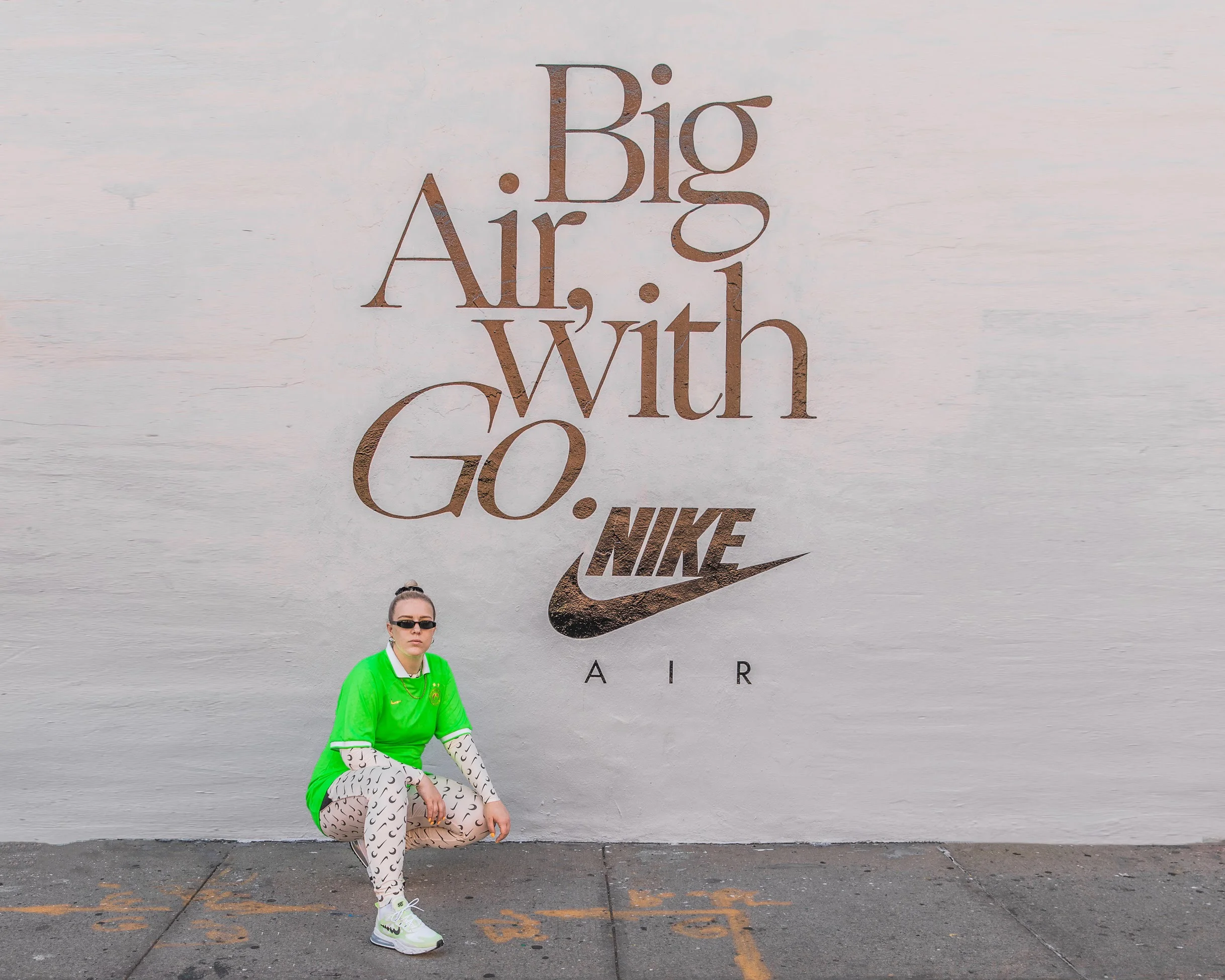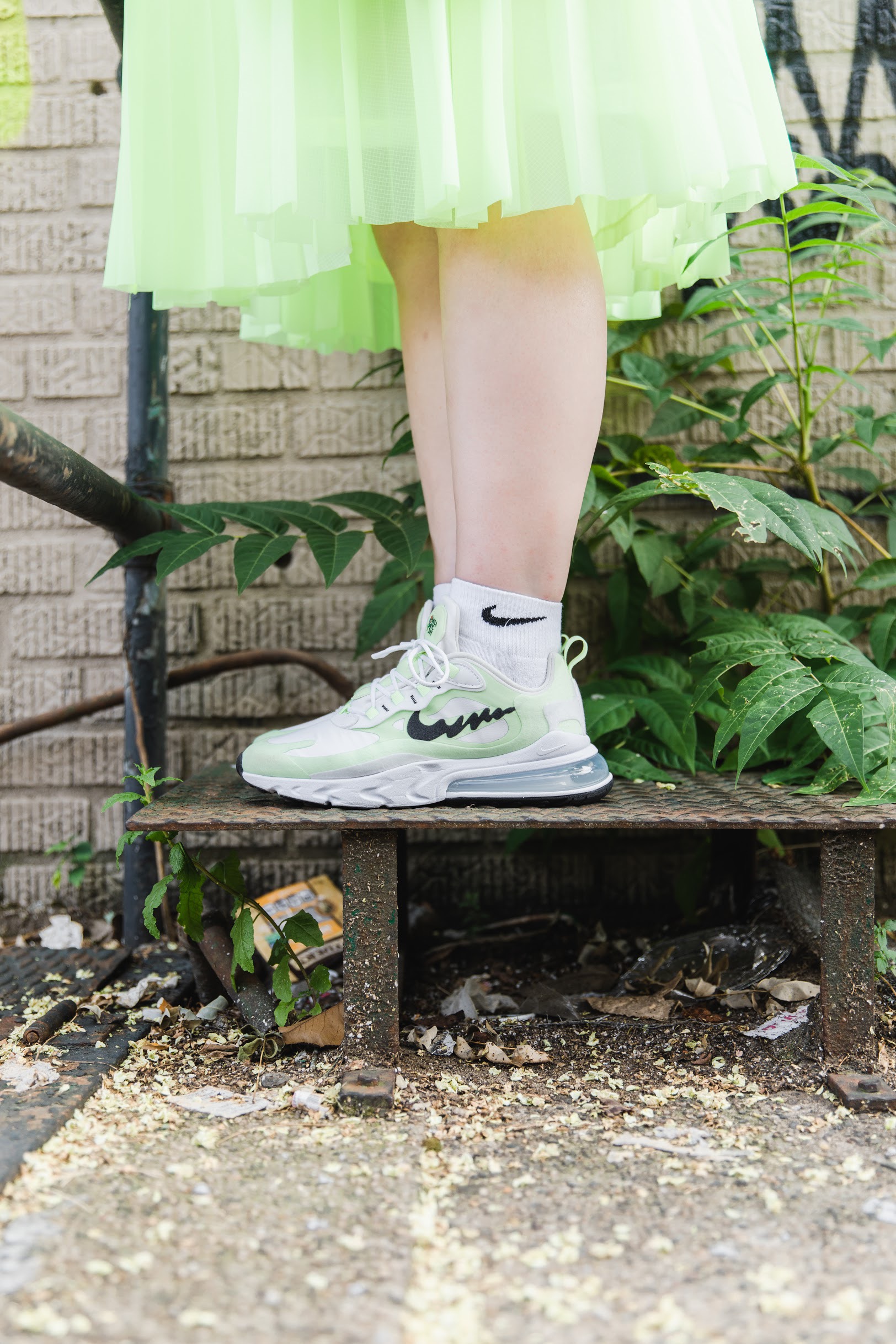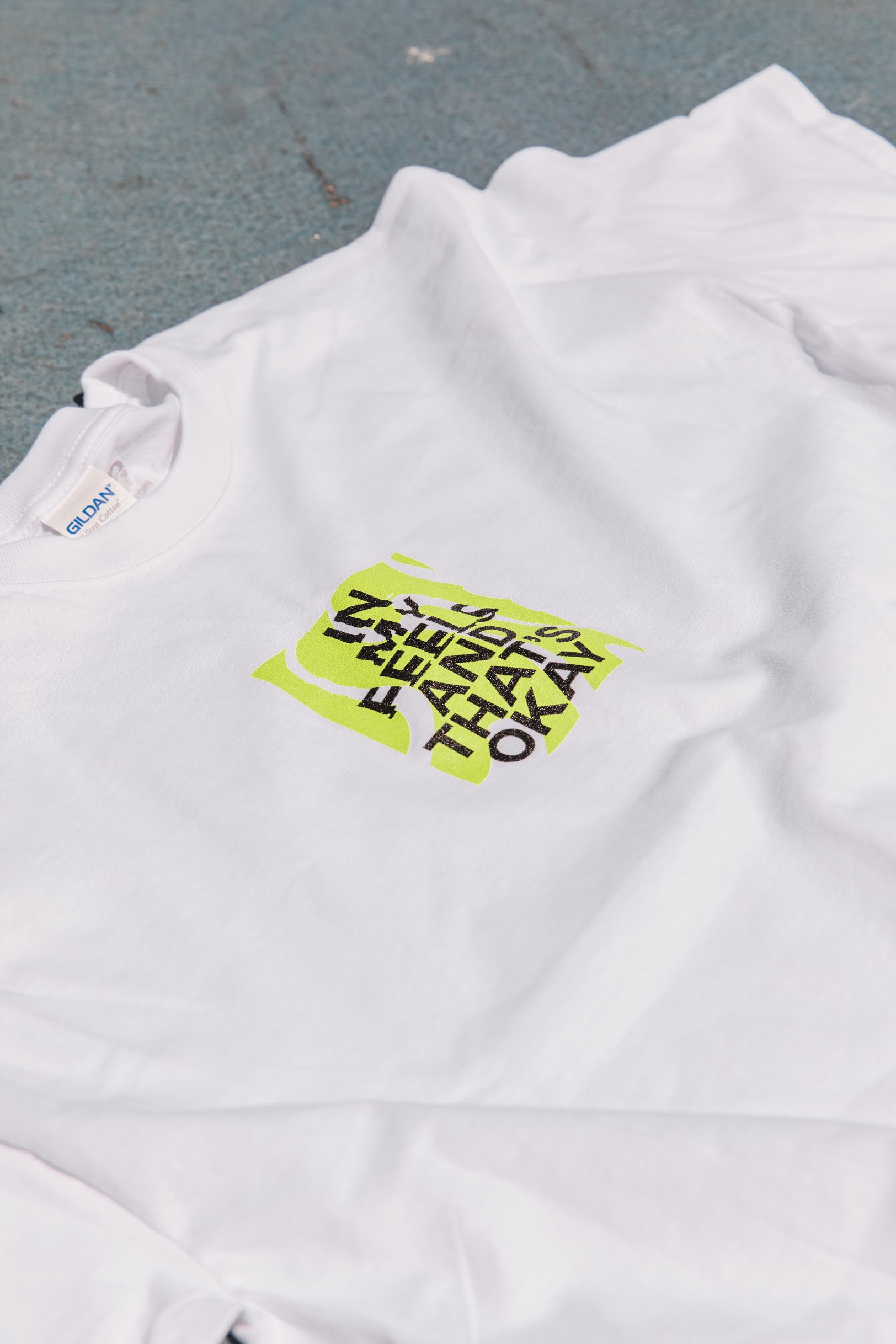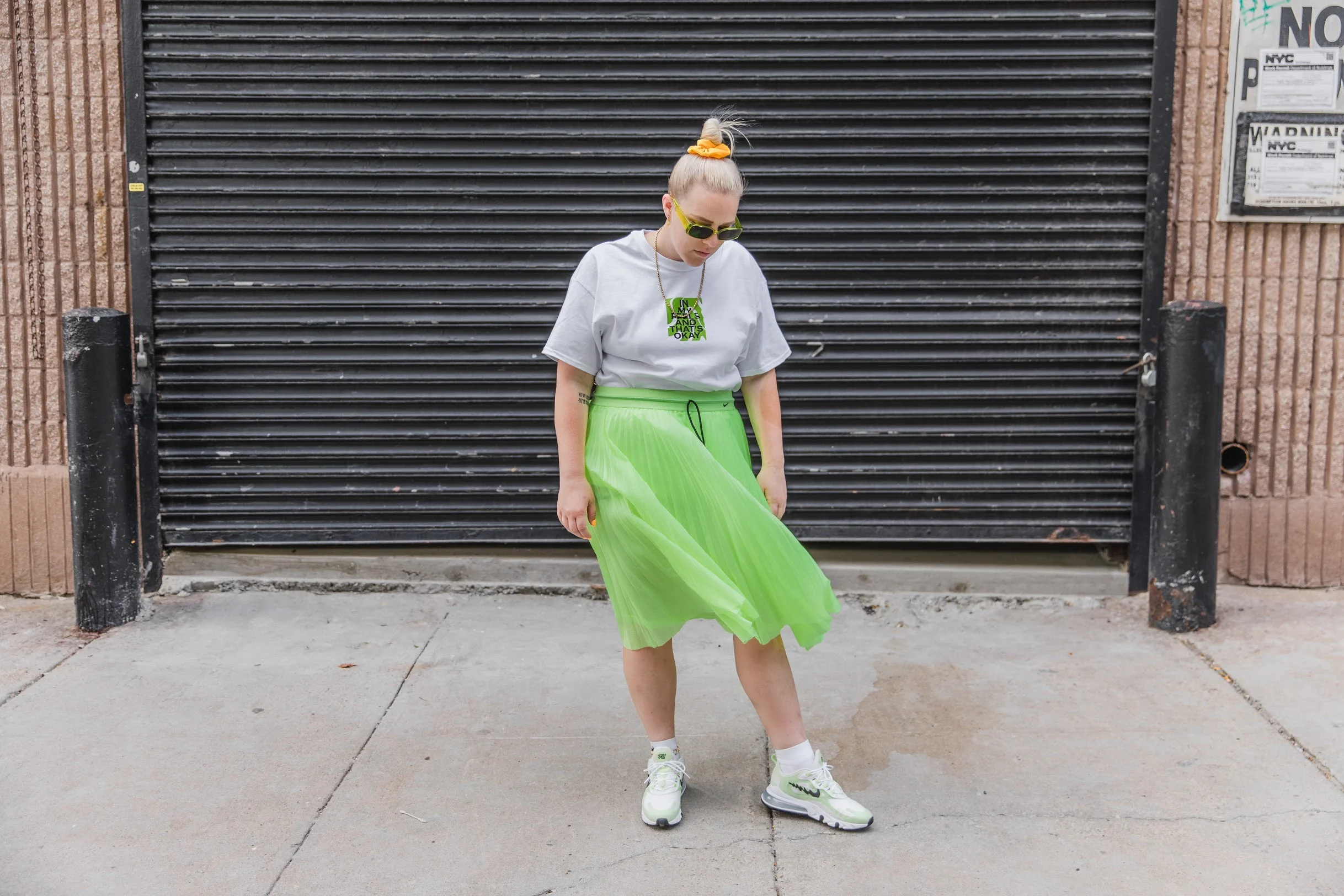One-on-One: Elizabeth Beecroft
All images by: Colin Ridgway
At CNKDaily, we pride ourselves on connecting the dots through a common bond: sneakers. Whether it be highlighting female entrepreneurs and creatives to OG sneaker collectors, everyone has a story to tell. There are some stories that speak so bravely to individual experiences and how to inspire others with these specific narratives. Through these stories we also find the most amazing women in our community.
If you frequently scroll through the IG streets, you may know Elizabeth Beecroft (AKA Liz or @lizbcroft). Not only does Liz rock a mean shoe game, she has a strong passion that goes beyond sneakers. Liz’s profession as a psychotherapist has given her the platform to advocate for mental health awareness while authentically showcasing her sneakHER style.
Through Nike x Cultivator, Liz designed a fresh take on the Air Max 270 React that merges both her passion for sneakers and her profession while highlighting a necessary message that resonates with so many individuals. Many of us need to unpack our feelings, and others need help in simply finding the resources to do so. Liz has a very special way of saying it’s perfectly OK to be ‘in your feels’.
CNK Daily had the opportunity to vibe with Liz and get to know her journey as well as her passion for mental health awareness, sneakers, and empowering ladies along the way.
THE 411 ON LIZ…
I was born and raised in Pennsylvania. Growing up I had a love of sports and played basketball, softball, and soccer since I was 3 throughout high school and into college. I was especially passionate about basketball, which is what sparked my interest in sneakers at a young age. I attended college at Susquehanna University which is a small liberal arts college in Central PA and I studied Psychology. After I graduated with my degree, I got some work experience for a year in the mental health field and then decided I wanted to pursue my Masters degree in Social Work. I moved to NYC in 2014 to attend grad school at NYU and graduated in 2016 with my MSW (Masters of Social Work) degree.
I always knew I wanted to help others and give back. My parents taught me the importance of being kind, caring, and compassionate since I was little and I think that’s what drove me into a profession that is dedicated to helping others. Another factor that led me to pursue social work, specifically a career as a psychotherapist, was my own personal history with understanding mental health and attending personal therapy sessions and how much of a positive effect this has had on my life.
FROM SNEAKERS TO SOCIAL WORK.
I’m very lucky to work for an organization that allows me to be who I am and it is reflected in my style. I’m able to wear sneakers to work and not have to be “buttoned up” all day every day, which isn’t me at all. One way this passion has overlapped is that my love of sneakers is a way to also help relate and make therapy less “stuffy” for my clients. I work primarily with children and adolescents so sometimes earning their trust and getting them to open up is hard. I honestly think that sharing a similar interest of sneakers with some of my clients helps engage them in therapy and allows them to feel that they can trust me and that I’ll understand some of the mental health symptoms they’re struggling with. I’ve also used my love of basketball to help engage and make things more comfortable for my clients. Those tend to be my successful cases because clients actually want to keep coming to therapy and don’t feel like they’re being forced into it.
On the flip side, using my social media platforms to show my passion for sneakers and also use my voice to advocate for mental health awareness has shown overlap between the two. Oftentimes there are other individuals in the sneaker community who will reach out and talk to me about their mental health struggles or DM me asking for resources or insight. A lot of people will tell me that they found my page because of sneakers and stay following me for my transparency and authenticity around mental health.
IN MY FEELINGS…
The core message of this shoe is to let people know that it’s okay to feel emotions, good or bad. Because of the stigma surrounding mental health, most people try to conceal any negative emotions and only express their positive ones. This does more harm than good because when we bottle those negative emotions up, we eventually get to a point where it explodes. It’s important to be able to express whatever we’re feeling freely because 1. It’s normal to “feel the feels” and 2. By doing this we’re working collectively to break this stigma and be able to raise awareness so we can all support one another through these tough times.
LIZ ON THE DESIGN OF HER AIR MAX 270 REACT…
I chose the color green on the shoe because that color represents mental health awareness. My choice of the wavy swoosh is to represent that healing is not linear. We will have good days and there will inevitably be bad ones too, so it goes. I also have “in my” on the left heel and “feels” on the right to add the reminder that being “in your feels” can mean feeling any type of feeling not just the bad ones that this phrase commonly gets associated with.
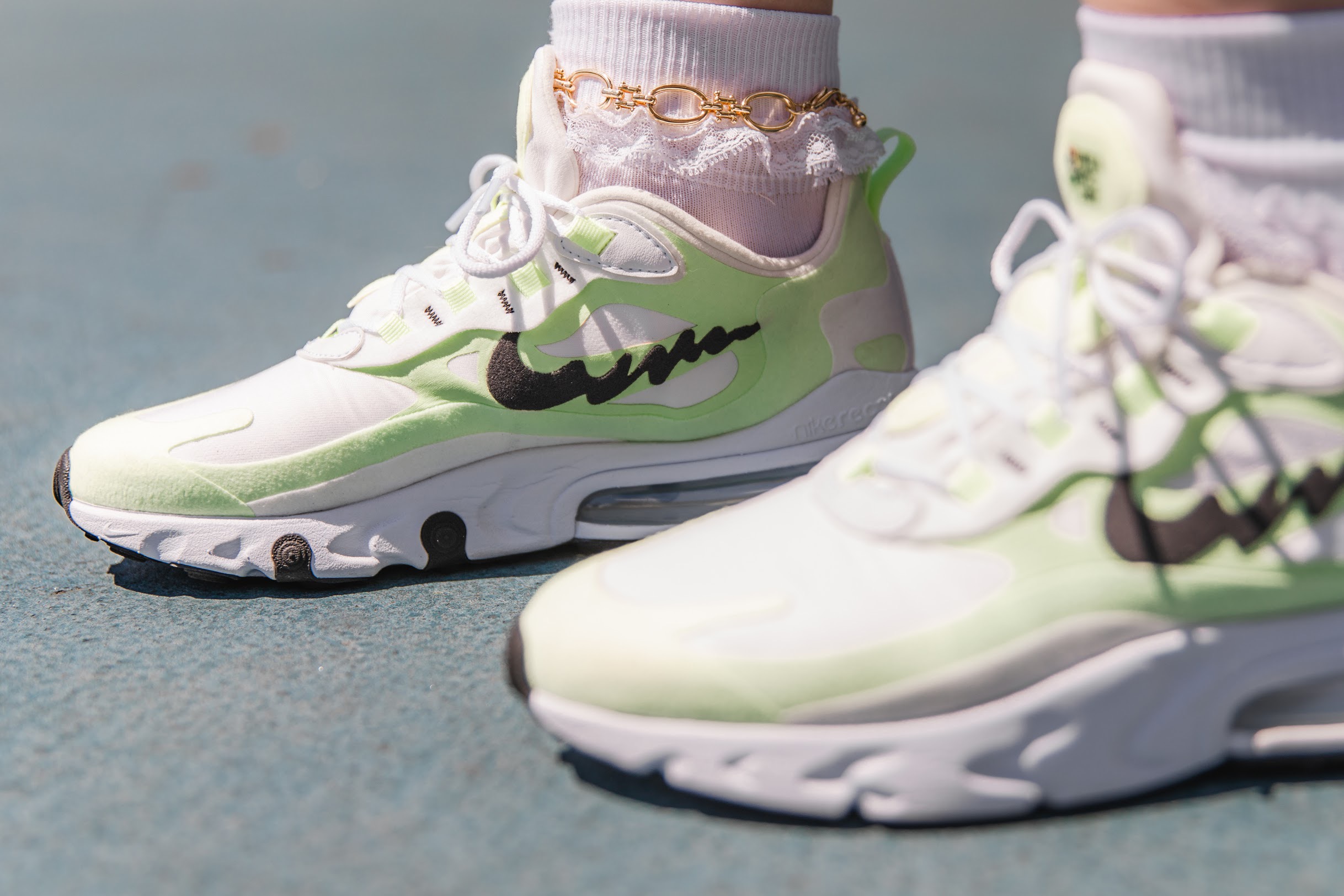
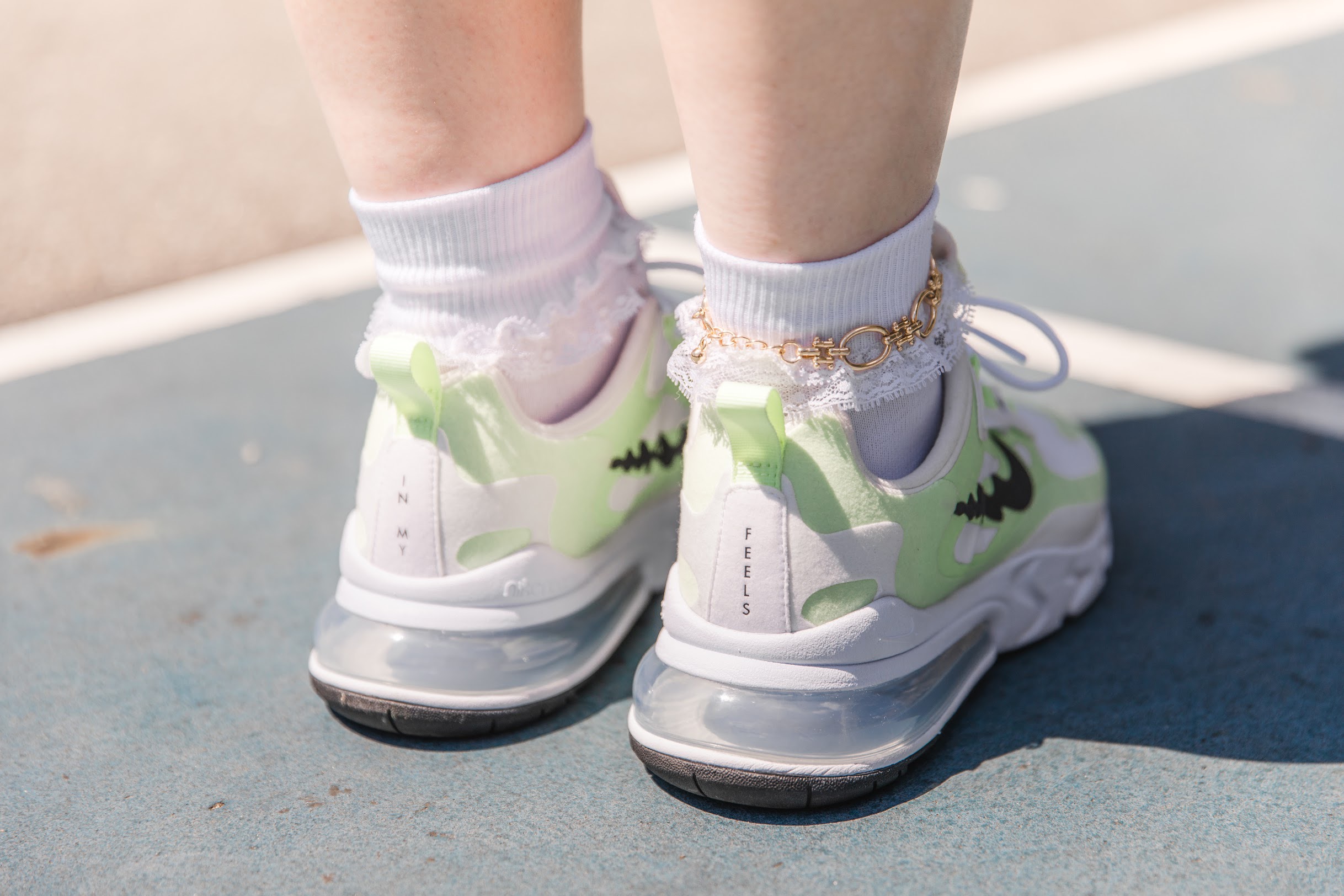
THE POWER OF VOICE.
I also want women to feel that they are able to use their voice and advocate for anything they are passionate about. I want women to feel confident in doing so and to continue to work together to support one another rather than trying to compete with others. Most importantly I want us, as women to continue to use our voices, to feel emotions and to continue to express how we feel. I’m tired of seeing that notion that women can be considered “crazy” or “hysterical” or any of the other negative emotional terms associated with us, because our feelings as females are valid and no one can take that away from us.
HEALING THROUGH SNEAKHER STYLE…
To me, this sneaker sends a message and advocates for mental health, which is often not discussed within the sneaker community. When I first started using instagram to share my personal style and love of sneakers I struggled with “imposter syndrome” because at that time I felt it wasn’t “cool” to talk about my career and be into sneakers, since it’s not something one normally sees. On the reverse, there aren’t many therapists out there who love sneakers and basketball like I do. At one point, I almost lived two separate lives: my professional life as a therapist and then my social media life where I was able to show more passions and interests that I had. I struggled with this because my values didn’t align with what I was doing.
I believe in being authentic and genuine yet I wasn’t doing that. I went back to therapy and my therapist helped me see that I’m unique and to be proud of that and have no shame in it. After feeling more comfortable in the reality of who I am and what my interests were I started being more transparent and open on my platform where I finally feel that I’ve found my niche and my voice. These shoes are a representation of that.
WHAT DOES SNEAK(HER) CULTURE MEAN TO LIZ?
To me, sneakHER culture means being unapologetically yourself. It means that as women we have to use our voice and address any concerns we have in order to be represented in this community. It means that despite the struggles and challenges we face, we will still look good and pull off some of the dopest fits while advocating for our needs (more smaller sizing options, more female focused campaigns, less glitter and frills, and more female sneaker collaborations).
i want to prove that anything the guys can do, we can do it just as well and we deserve to be taken seriously and respected. SneakHER culture is all about women supporting women, collaborating with women, motivating women, and inspiring women.
Elizabeth’s sneakers are available Monday 8/19 at 8am EST via our shopping button below so stay tuned. Liz’s proceeds from this sneaker will be donated to the American Foundation for Suicide Prevention. Connect more with Elizabeth through her Instagram HERE.
If you’re struggling with your mental health or need someone to talk to, we’ve included a list of helpful numbers for you. See below:
Top HelpLine Resources
Anxiety and Depression Association of America (ADAA) provides information on prevention, treatment and symptoms of anxiety, depression and related conditions (240-485-1001)
National Alliance on Mental Health (NAMI) (800-950-NAMI)
Children and Adults with Attention-Deficit/Hyperactivity Disorder (CHADD) provides information and referrals on ADHD, including local support groups (800-233-4050)
Depression and Bipolar Support Alliance (DBSA) provides information on bipolar disorder and depression, offers in-person and online support groups and forums (800-826-3632)
International OCD Foundation provides information on OCD and treatment referrals (617-973-5801)
National Center of Excellence for Eating Disorders (NCEED) provides up-to-date, reliable and evidence-based information about eating disorders (800-931-2237)
Schizophrenia and Related Disorders Alliance of America (SARDAA) offers Schizophrenia Anonymous self-help groups and toll-free teleconferences (240-423-9432)
Sidran Institute helps people understand, manage and treat trauma and dissociation; maintains a helpline for information and referrals (410-825-8888)
Treatment and Research Advancements for Borderline Personality Disorder (TARA) offers a referral center for information, support, education and treatment options for BPD (888-482-7227)


